Books to read in the ‘alternative facts’ era

In the month since President Donald Trump took office, sales of George Orwell’s dystopian novel 1984 have catapulted the book to the top of Amazon’s bestseller list. In fact, in the days immediately following the inauguration, sales of the novel by publisher Signet Classics jumped nearly 10,000 percent.
But, according to our experts, 1984 isn’t the only book to which readers should turn for insight to, comparison of, and lessons about today’s political and social climate. Here’s a list of book recommendations from five Northeastern English professors.
Marina Leslie, associate professor of English
Recommendation: Parable of the Talents, by Octavia Butler
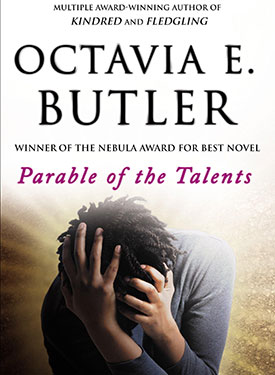
“Parable of the Talents,” by Octavia Butler: Seven Stories Press
Last semester I offered a freshman seminar called “Trouble in Utopia,” and one book I assigned resonated very disturbingly during the election.
We read Octavia Butler’s Parable of the Talents, the sequel to her novel Parable of the Sower. In the near-future setting of this novel, Butler’s heroine, Lauren Olamina, tries to set up a utopian community in a world that has taken an apocalyptic turn. In what seems an uncannily prescient account, Butler imagines the United States under a white supremacist president who tacitly incites and endorses violence and mob rule under the slogan, “make America great again.”
Octavia Butler, who died before her time and at the height of her powers in 2006, is a rarity in science fiction: black and female. I believe her particular message of utopian hope in the face of dystopian social conditions makes her a more important and compelling read than the classic dystopian novels presently topping the charts on Amazon. Butler’s novel offers an unblinking view of the fragility of the social contract and the perils of unchecked racism and misogyny, while remaining committed to representing all the heterogeneous forms of affiliation that can make a community and the conditions for thriving and creating in a dangerous and antagonistic world.
Erika Boeckeler, assistant professor of English
Recommendation: The Taming of the Shrew, by William Shakespeare
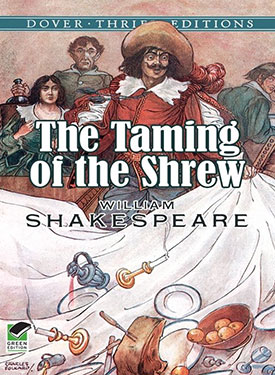
“The Taming of the Shrew,” by William Shakespeare: CreateSpace Independent Publishing Platform
Older ladies held some of the more jolting signs at the recent women’s marches: “I can’t believe I’m still protesting this crap!” Shakespeare’s female characters, who are over 400 years old, would angrily be holding the same signs if they were here today.
The Taming of the Shrew tells the story of wealthy men, led by a vulgar “outsider” nobleman, who attempt to silence an outspoken young woman (the “shrew”). Although they fear him, the other men in power encourage or turn a blind eye to the tamer’s cruel physical and psychological tactics because he helps them advance their own agendas.
And yet, despite the men’s best efforts, female voices cannot be suppressed. Women and their allies attempt to change the system from within or, like the shrew, batter the system even when socially marginalized.
The fact that this is a play—not, say, a novel or a newspaper article—is particularly significant because it suggests a variety of small daily resistance performances that disempowered people can use to change oppressive social conditions. Shakespeare also reminds us that language is an important part of resistance: he turns the negative “shrew” into a positive by showing how all of the women become “shrewd.”
Kathleen Coyne Kelly, professor of English
Recommendations: The Handmaid’s Tale and the MaddAddam trilogy, by Margaret Atwood; Animal Farm, by George Orwell; Carbon Diaries 2015, by Saci Lloyd; Flight Behavior, by Barbara Kingsolver
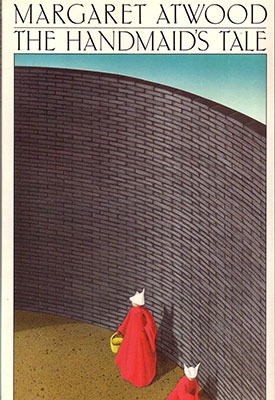
“The Handmaid’s Tale,” by Margaret Atwood: Anchor
At the top of my list is Margaret Atwood’s The Handmaid’s Tale, which, along with Orwell’s 1984, is seeing a surge in sales since Jan. 20.
Imagine being a woman in a United States (in New England, to be more precise) that has become a Christian fundamentalist dictatorship: first, you lose all of your money and your assets; then you are put under the “protection” of your husband; then you are forbidden to read and are reprogrammed to serve as a “handmaid”—a reproductive machine.
Let’s not forget Orwell’s Animal Farm. Remember Squealer, the master propagandist of the farm?
“All the other male pigs on the farm were porkers,” Orwell writes. “The best known among them was a small fat pig named Squealer, with very round cheeks, twinkling eyes, nimble movements, and a shrill voice. He was a brilliant talker, and when he was arguing some difficult point he had a way of skipping from side to side and whisking his tail which was somehow very persuasive. The others said of Squealer that he could turn black into white.”
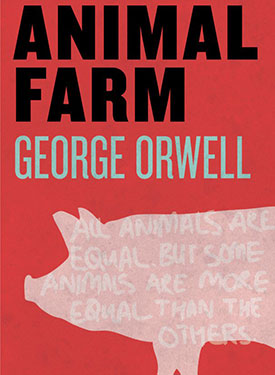
“Animal Farm,” by George Orwell: Signet
I am most concerned about the possibility that the Environmental Protection Agency will be dismantled and that science will be replaced with some politically-expedient pseudo-science. In my writing course, “Climate-Change Fiction and Disaster Film,” we are exploring the question, “Why do we like telling stories about bad ecological futures?”
We read Saci Lloyd’s Carbon Diaries 2015, about the crises a family endures when everyone is forced to go on carbon rationing and the U.K. is thrown into chaos. Lloyd’s heroine, Laura Brown, suffers typical teenage angst—school, embarrassing parents, and boyfriend trouble—while attempting to cope with a harsh, inconvenient truth: we’re not kidding, the life that you thought you were working toward? OVER.
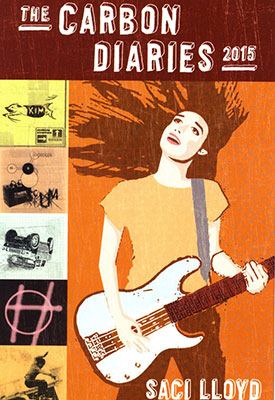
“Carbon Diaries 2015,” by Saci Lloyd: Holiday House
We could have read Atwood’s post-apocalyptic MaddAddam trilogy, in which corporate greed has destroyed the environment and genetic engineering has gone sickeningly wrong, or Barbara Kingsolver’s Flight Behavior, a tale of endangered monarch butterflies and the humans who become caught up in their fight for survival on a mountain in Tennessee. Kingsolver also offers us urban blue-staters compelling insights into the lives of rural Americans who might have, if they didn’t live in a novel, voted for Trump—people who don’t have the luxury of choosing between their lives, their livelihood, and their happiness and, to them, some abstract slogan like save the planet.
Nicole N. Aljoe, associate professor of English
Recommendation: My Bondage and My Freedom, by Frederick Douglass
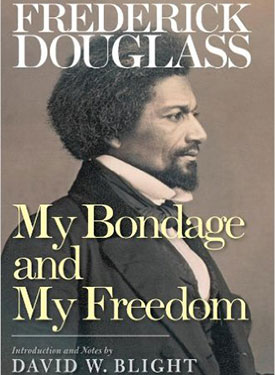
“My Bondage and My Freedom,” by Frederick Douglass: Penguin
In light of the president’s mistaken understanding about Frederick Douglass, I would suggest reading Douglass’ second autobiography My Bondage and My Freedom. Written 10 years after the publication of The Narrative of the Life of Frederick Douglass, and after he had become editor of his own newspaper, The North Star, it offered Douglass the opportunity to tell his own story in his own manner, rather than adhering to the narrow framework allowed by William Lloyd Garrison and the American Abolitionist Society.
My Bondage and My Freedom is a much more explicitly political text then Douglass’ first narrative. His famous speech about the hypocrisy of celebrations of American liberty in “What to the Slave, is the Fourth of July?” concludes the narrative. This text is relevant today because Douglass marshalled the power of narrative and story to force real and substantive changes in peoples’ lives. The powerful literary techniques that abolitionist William Wilberforce made him remove in order to emphasize more of the plantation are allowed to flourish in My Bondage and My Freedom, highlighting Douglass’ skills as a writer as well as orator. Faced with the seeming overwhelming might of oppressive forces, Douglass’ text offers not only a model for how to resist, but also the power of literature to change the world.
Bonnie TuSmith, associate professor of English
Recommendation: When the Emperor Was Divine, by Julie Otsuka.
This is a very special novella on the experience of a middle-class Japanese American family during World War II. Historically, 120,000 Americans of Japanese descent were incarcerated at “internment camps” for the duration of the war (more than four years). The novel might provide some insight—
especially on the issue of human toll—into the mistrust of “aliens” under Trump.
Patrick Mullen, associate professor of English
Recommendations: Berlin Stories and Christopher and His Kind, by Christopher Isherwood
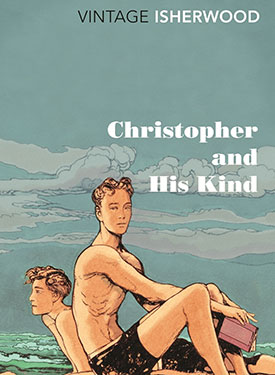
“Christopher and His Kind,” by Christopher Isherwood: Penguin
I would suggest two titles, both by Christopher Isherwood. The first is Berlin Stories and the second is Christopher and His Kind. They recount Isherwood’s time spent in Germany as the Nazis came to power. They give sharp insight both into language and politics and into the ways that the violence of fascism shapes personal relationships.





